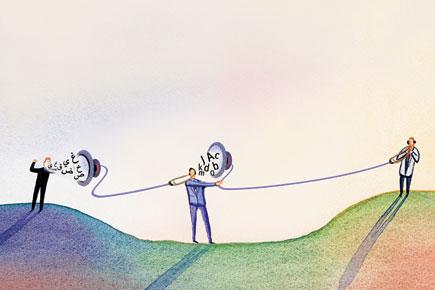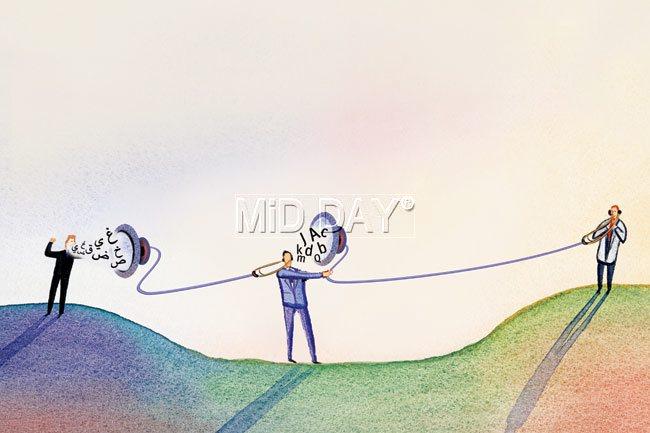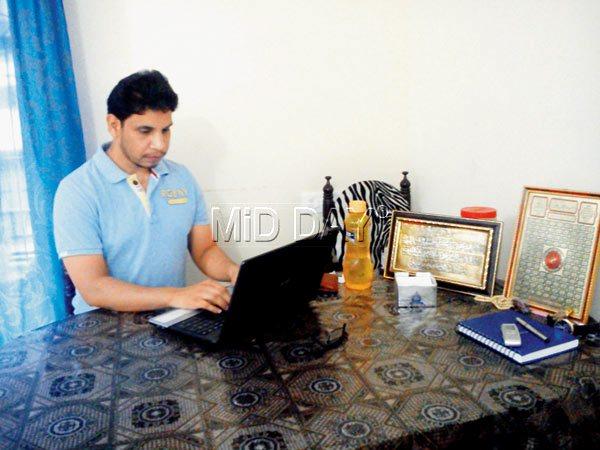Arabic translators have a huge role in keeping the medical tourism industry, which is expected to be worth $6 billion by 2018, afloat. And Mumbai, like other Indian metros, is home to such translators. Anu Prabhakar speaks to such professionals about their transition from a municipal school or madrassa graduate to someone who bandies medical terms about, effortlessly

Arabic translators, medical tourism industry, madrassa graduate, A Waheed, Kurla resident, Kuwaiti man
It is with remarkable ease that A Waheed discusses the complicated medical case of a young Kuwaiti man who was rendered paralysed post a tragic accident back in his home country, a couple of years ago. “He was driving his new car at around 180 km to 200 km per hour,” says Waheed, when we meet him at his sparsely decorated apartment in Kurla. “He lost control of the car, which soon turned turtle. His friend, who was also with him, died on the spot while he sustained serious injuries to his spinal cord, due to which he was immobile neck down and had to move around in a wheelchair,” elaborates the 29-year-old, with the air of someone who knows the medical case intimately.
 Illustration/ Amit Bandre
Illustration/ Amit Bandre
This is no misplaced assumption. Waheed does, in fact, know the case history like the back of his hand, as the boy and his mother travelled to Mumbai after the accident for treatment. And it was right here in the city that Waheed met the grief-stricken family in his capacity as senior Arabic translator — someone, who would help bridge the linguistic gap between the patient and the doctor.
In the course of several doctors’ visits, consultations and nail-biting diagnosis at a leading city hospital, Waheed, who also runs the website www.arabicexpert.in, grew close to the family — so much so, that he even travelled to Kerala on the mother’s request, to check out the state’s many Ayurvedic centres for her son’s treatment. “I went to Kerala as the boy’s uncle had to go back to Kuwait because his sister was sick. After I came back from Kerala, the mother took her son to an Ayurvedic centre and stayed there for 15 to 20 days for treatment but there was no improvement,” he says, adding that the family eventually went on to meet doctors in Delhi, Bangkok and even France. “We still remain in touch. She is very anxious about her son’s treatment. That is a mother’s love,” he smiles sadly.
A money spinning industry
Arabic translators such as Waheed are indispensable to what is, undisputedly, a money-spinning industry. Consider the statistics: According to a 2014 report by Punjab Haryana Delhi (PHD) Chamber of Commerce and Industry, the Indian medical tourism industry is ‘expected to reach $6 billion (around R36,000 crore) by 2018, as the number of patients arriving in the country for treatment is expected to double over the course of the next four years’.

A Waheed at his Kurla residence. Pic/Anu Prabhakar
So how important are these Arab translators? Anandswarup Joshi of the Vikhroli-based medical tourism company Samaira Global Wellness recalls the time he inadvertently hired a translator, who couldn’t speak Arabic fluently. “I hired him based on the recommendation of a contact. But it was so difficult as he was unable to translate what the patients had to say to the doctors. Ultimately, we had to call the patient’s doctor in Yemen to find out the medical history,” says Joshi. Although figures vary, experts from the field say such translators are, on an average, hired for R4,000 to R5,000 for eight hours.
‘Madrassas do not teach jihadi to students’
Interestingly, as a recent magazine report pointed out, such job opportunities have managed to successfully absorb former students of madrassas, who spend years learning religious texts such as the Quran and Hadees, and have a strong knowledge of the Arabic language. Although efforts are on to update the curriculum followed in these educational institutions, the Arabic translators we speak to explain that primary importance was placed on learning religious texts over other subjects such as science.
So question Waheed, who graduated from a madrassa in Lucknow, about how he manages to translate difficult medical terms into English and Arabic and he explains that athough he found it difficult to translate patients’ and doctors’ conversations early in his career, today, he faces no such issues. “We search the Internet for medical terms.
We also keep reading articles in the health section of international publications and newspapers. Through all this, we remain up-to-date on medical news and terminologies,” he says.
He also points out that like any other educational institution in India, especially the government-run ones, madrassas too have their own perks and shortcomings. “There is a good environment in madrassas to learn. But in the 10 years we spent at the madrassa, we were taught the same things repeatedly. The curriculum was not updated as per modern standards.”
When he completed his studies in 2005 and shifted to Mumbai, the translator himself felt a little anxious about his future, before the chance to work as an Arabic translator came knocking. “Students in madrassas need to be taught that besides leading others in prayer and teaching in a madrassa, there are other fields that one can explore like medicine, engineering, civil services and so on. They must feel that they have some value in the society, that what they have learnt will not go to waste,” he explains.
“Madrassa students are very hardworking and many of them have reached great heights,” he continues. “And such institutions are portrayed by the media is a bad manner and they say that madrassas teach jihad to students. But that is not true.”
Thirty-two-year-old Thane-based Arabic translator Mehboob Jaffer Khan, who studied in a madrassa for seven years, agrees that his limited knowledge in science never posed a problem in the job. “Science wasn’t taught to us in detail in my madrassa, but that is okay. Today, we have Google. And if a medical term is too tough for us to understand, we can always ask the doctor to explain the meaning to us, and we can paraphrase it for the patients,” he explains.
Hospitals’ in-house translators
Hospitals all over the country have already cashed in on the boom in the industry by hiring in-house Arabic translators. Joshi explains that while some hospitals have translators on a case to case basis, other have in-house translators. For instance, according to the Andheri West-based Kokilaben Dhirubhai Ambani Hospital and Medical Research Institute’s website, they have dedicated international patient co-ordinators and language interpreters.
One such translator from a leading city hospital, explains, on the condition of anonymity, “We explain everything to patients beforehand — like the pain they may feel say after a surgery and so on. We always accompany them during doctor’s rounds and consultations, depending on how badly they need a translator. There have also been times when patients first tell me the moment they experience pain, even before they tell the doctor. Since we meet under stressful circumstances, we inevitably form a bond,” he explains. “We also tweak their food at the hospital depending on their dietary preferences. If they prefer, say, shawarma, we try and make it available to them,”
he explains.
When we tell Waheed that we would probably find it impossible to translate such medical terms into our own mother tongue, he laughs. “And I may find it difficult to translate them into any other language like Hindi or Marathi,” he chuckles.
 Subscribe today by clicking the link and stay updated with the latest news!" Click here!
Subscribe today by clicking the link and stay updated with the latest news!" Click here!









